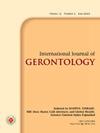Risk Factor Differences in Calcified and Non-Calcified Cervical Carotid Plaque
IF 0.3
4区 医学
Q4 GERIATRICS & GERONTOLOGY
引用次数: 0
Abstract
Background: Vascular calcification is associated with the inflammatory process. Here, we investigated the relationship of serum lipoprotein-associated phospholipase A2 (Lp-PLA2) and traditional risk factors with carotid plaque calcification in patients with ischemic stroke (IS) or transient ischemic attack (TIA). Methods: Patients with IS or TIA were divided into the calcification (Ca) and non-calcification (nCa) groups according to the results of the CTA of carotid artery with plaque. LP-PLA2 level, demographics, vascular risk factors, and other clinical data were compared to analyze the risk factors for carotid plaque calcification. Results: A total of 260 patients were enrolled, including 134 patients in Group Ca and 126 patients in Group nCa. Multiple logistic regression showed Lp-PLA2 (p = 0.016), age (p = 0.010), and diabetes (p = 0.010) were independent risk factors of carotid artery plaque calcification. The Spearman's rank correlation coefficients showed Lp-PLA2 (r = 0.372, p = 0.000), age (r = 0.325, p = 0.000), and diabetes (r = 0.421, p = 0.000) had a positive correlation with the calcification of the carotid artery. Conclusions: Serum Lp-PLA2, age, and diabetes were associated with carotid plaque calcification in patients with cerebral infarction or TIA. The inflammatory process mediated by Lp-PLA2 and diabetes may be involved in the pathogenesis of carotid calcification.钙化和非钙化颈动脉斑块的危险因素差异
背景:血管钙化与炎症过程有关。在这里,我们研究了血清脂蛋白相关磷脂酶A2 (Lp-PLA2)和传统危险因素与缺血性卒中(IS)或短暂性脑缺血发作(TIA)患者颈动脉斑块钙化的关系。方法:根据颈动脉斑块CTA结果将IS或TIA患者分为钙化(Ca)组和非钙化(nCa)组。比较LP-PLA2水平、人口统计学、血管危险因素等临床资料,分析颈动脉斑块钙化的危险因素。结果:共纳入260例患者,其中Ca组134例,nCa组126例。多元logistic回归分析显示,Lp-PLA2 (p = 0.016)、年龄(p = 0.010)、糖尿病(p = 0.010)是颈动脉斑块钙化的独立危险因素。Spearman等级相关系数显示,Lp-PLA2 (r = 0.372, p = 0.000)、年龄(r = 0.325, p = 0.000)、糖尿病(r = 0.421, p = 0.000)与颈动脉钙化呈正相关。结论:血清Lp-PLA2、年龄和糖尿病与脑梗死或TIA患者颈动脉斑块钙化有关。由Lp-PLA2和糖尿病介导的炎症过程可能参与了颈动脉钙化的发病机制。
本文章由计算机程序翻译,如有差异,请以英文原文为准。
求助全文
约1分钟内获得全文
求助全文
来源期刊
CiteScore
0.60
自引率
0.00%
发文量
0
审稿时长
6-12 weeks
期刊介绍:
The Journal aims to publish original research and review papers on all fields of geriatrics and gerontology, including those dealing with critical care and emergency medicine.
The IJGE aims to explore and clarify the medical science and philosophy in all fields of geriatrics and gerontology, including those in the emergency and critical care medicine. The IJGE is determined not only to be a professional journal in gerontology, but also a leading source of information for the developing field of geriatric emergency and critical care medicine. It is a pioneer in Asia.
Topics in the IJGE cover the advancement of diagnosis and management in urgent, serious and chronic intractable diseases in later life, preventive medicine, long-term care of disability, ethical issues in the diseased elderly and biochemistry, cell biology, endocrinology, molecular biology, pharmacology, physiology and protein chemistry involving diseases associated with age. We did not limit the territory to only critical or emergency condition inasmuch as chronic diseases are frequently brought about by inappropriate management of acute problems.

 求助内容:
求助内容: 应助结果提醒方式:
应助结果提醒方式:


